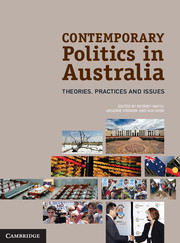Book contents
- Frontmatter
- Contents
- Tables and figures
- Contributors
- Acknowledgements
- Introduction
- I Contemporary Theories of Australian Politics
- Part II Politics in Everyday Australian Life
- Part III Elections
- Part IV Participation and Representation
- Part V Inside the Australian State
- Part VI Contemporary Public Controversies
- Introduction to Part VI
- 25 A Bill of Rights
- 26 Spending and taxing
- 27 Employment and education
- 28 Cities
- 29 Indigenous Australians
- 30 Health
- 31 The environment
- 32 Australia in the world
- Glossary
- References
- Index
- References
29 - Indigenous Australians
from Part VI - Contemporary Public Controversies
Published online by Cambridge University Press: 05 June 2012
- Frontmatter
- Contents
- Tables and figures
- Contributors
- Acknowledgements
- Introduction
- I Contemporary Theories of Australian Politics
- Part II Politics in Everyday Australian Life
- Part III Elections
- Part IV Participation and Representation
- Part V Inside the Australian State
- Part VI Contemporary Public Controversies
- Introduction to Part VI
- 25 A Bill of Rights
- 26 Spending and taxing
- 27 Employment and education
- 28 Cities
- 29 Indigenous Australians
- 30 Health
- 31 The environment
- 32 Australia in the world
- Glossary
- References
- Index
- References
Summary
This chapter, more than any other in this book, applies some of the insights drawn from discourse theories outlined in Chapter 5 to Australian politics. The chapter does not deny the reality of deep material inequalities between Indigenous and non-Indigenous Australians (see Chapter 4), or the impact of political institutions (Chapter 2), or the consequences of the behaviour of bureaucrats, politicians and others (Chapter 3). Its argument is that these factors can be understood through the construction and circulation of a discourse of crisis that promotes the continuation of failed policy approaches. The chapter refers briefly to the way in which such a discourse has circulated internationally (see Chapter 6). It then canvasses alternative discourses and policies developed by Indigenous leaders and communities. The interpretation presented here suggests the need, among other things, for a rethinking of Indigenous representation and participation in Australian democracy (see Chapter 1).
Recently, it has become common to speak of a crisis in Australian Indigenous affairs. Such ‘crisis talk’ is mobilised by individual Indigenous and non-Indigenous commentators, community leaders, politicians and bureaucrats, as well as Indigenous and non-Indigenous organisations and agencies charged with the duties of program management and service delivery to Indigenous communities. There appears to be no argument that, in relation to Indigenous communities – especially in the remote parts of Australia – there is a crisis unfolding across the continent: a calamitous conjunction of violence, substance abuse and other forms of social dysfunction, all underscored by appalling socio-economic indicators (Yu, Duncan and Gray 2008).
- Type
- Chapter
- Information
- Contemporary Politics in AustraliaTheories, Practices and Issues, pp. 332 - 343Publisher: Cambridge University PressPrint publication year: 2012



